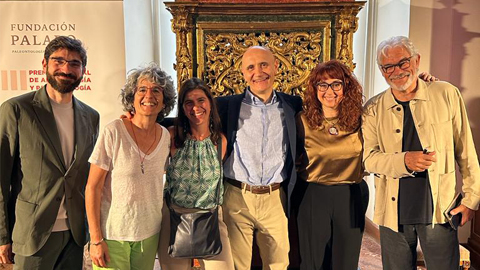The project "Almoloya-Bastida: power, gender and kinship in a forgotten Bronze Age civilisation" and the El Argar culture, studied by the ASOME research group of the Department of Prehistory, won the 3rd Palarq Foundation National Archaeology Prize, endowed with 80,000 euros. The prize, awarded unanimously by the jury, recognises the quality and innovative nature of the research and its contribution to knowledge about politics and gender relations in one of the first state-level societies on the European continent.

The award was collected by all members of the research team: Vicenç Lull (project director), Rafael Micó, Cristina Rihuete, Eva Celdrán, Camila Oliart and Miguel F. G. Valério, in a ceremony held on 15 June at the National Archaeological Museum (MAN) in Madrid, in the presence of Minister for Culture and Sport Miquel Iceta, and Antonio Gallardo Ballart, president of the Palarq Foundation.
The jury was unanimously in favour of recognising the project being researched by the UAB. During his speech, the spokesperson for the jury, Luis Monreal, highlighted "the quality of the research, the relevance of the subject, the potential for development, the contribution to fill a gap in knowledge and the capacity for dissemination", as well as the innovative nature of the project, "which aims to unravel immaterial aspects of a millenary civilisation that existed in Spain, in an area comparable to the surface area of Belgium, and of a culture from which the inequalities and relationships, kinships and the formation of a society that disappeared are unravelled".
The president of the Palarq Foundation, Antonio Gallardo Ballart, stressed that the winning project "is the result of many years of excellent work that has highlighted a very important culture of the Bronze Age that was not known, the Argar culture, within the geographical scope of several provinces, mainly that of Murcia. It is a far-reaching project: with many years of research in the past, in the present and with many aspects of the Argar culture that will be discovered and disseminated in the future".
In his speech, Vicenç Lull, the most senior researcher on the team, praised the work of the Palarq Foundation, "where teamwork is being valued, and this commitment in a context of competition such as the current one is very commendable". Lull also criticised the European Union's research policy in the fields of archaeology and palaeontology, especially with regard to the impact reports and evaluation criteria of its programmes in this field.
The funding will allow the research team to concentrate "mainly on basic research and its dissemination", explained Cristina Rihuete. For his part, Rafael Micó (PI of the project) highlighted the contribution of the study of the Argaric sites awarded "to the knowledge and debate on the origin of civilisations and societies with inequalities and the origin of violence".
The team of the Mediterranean Social Archaeoecology Research Group (ASOME-UAB) began its studies at the Murcian sites of La Almoloya (Pliego) and La Bastida (Totana) more than two decades ago. Its research has brought to light important discoveries at both sites, which have provided an increasingly detailed picture of the political organisation, economic relations and kinship norms at the sites, as well as a more detailed picture of the social and economic relations between the two sites.






